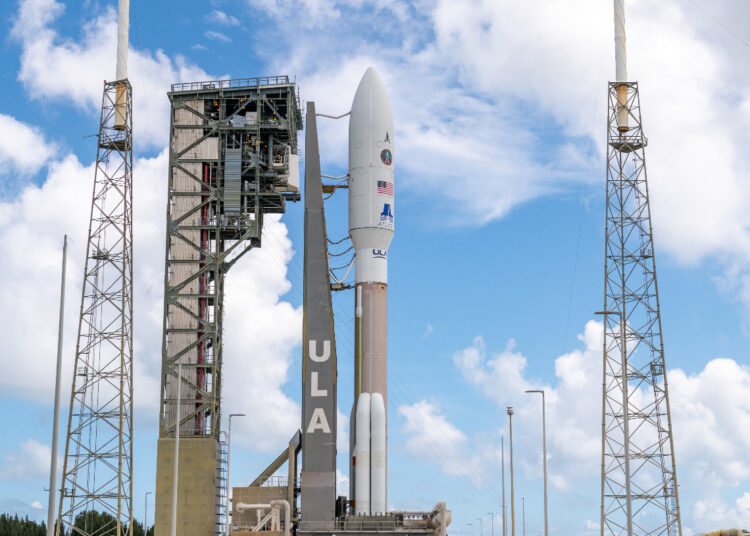With overwhelming bipartisan support and his infamous sharpie in hand, former President Donald Trump made Ronald Reagan’s dreams a reality. Nearly four decades after the Cold War-era president called for the weaponization of space, the Trump administration created the first new military branch since 1947: the United States Space Force (USSF).
The USSF’s inception expanded on Washington’s existing and persisting goals to expand U.S. influence in space. Since 2017, NASA and the State Department have worked to recruit signees to the Artemis Accords, a seven-page document outlining Washington’s vision for space governance. While typical Washington partners—including Japan, the United Kingdom, and the United Arab Emirates—were quick to join as founding members, the twenty-one country list of signees is notably missing Russia and China as terrestrial rivalries threaten to go interstellar.
In an effort formally initialized under the uniquely space-forward Trump presidency, Washington is trying to call dibs on writing the rules in space, eager to create a model that mirrors America’s terrestrial geopolitical and commercial preeminence. But Russia and China aren’t going to sit idle, and, according to some, Moscow and Beijing—not Washington—are leading the charge.
In the last two years, China and Russia expanded their in-orbit assets by 70 percent following their already impressive three-fold increase in space presence from 2015 to 2018. While large swaths of this growth have—thus far—been civilian-led, the same technologies that achieve scientific goals could also achieve military goals. But even those more peaceful commercial endeavors make Washington nervous, and rightfully so. The prospect of losing out on a $1.4 trillion industry risks undercutting U.S. dominance, both in space and on earth. If the quest for geopolitical clout wasn’t going to force confrontation, economic interests will.
Beijing and Moscow understand this, so they’ve been preparing. The core of this conversation is satellites, the backbone of U.S. command and control and prime targets of preliminary strikes preceding a broader conflict. As early as 2007, China was bolstering its ability to take out satellites in low earth orbit (LEO), where over 80 percent of the world’s satellites are located. Chinese defense academics haven’t been vague about the purpose of these ground-based anti-satellite (ASAT) systems, frequently arguing that they could be used to “blind and deafen the enemy” by targeting the communication, navigation, and early warning systems that help protect Washington from attacks. Putin, not one to let Russia lag behind, reminded the world of Moscow’s space abilities by testing one of its ASAT systems on an inactive Russian satellite. That satellite is now some 1,500 pieces of space debris.
These ground-based capabilities, however, only scratch the surface, as Russia and China work to take out U.S. satellites with “on-orbit” technology “via jamming, cyberspace, [and] directed-energy weapons,” or lasers. Russia, for example, has proved it can now launch ASAT missiles from satellites. Exciting, right?
As Beijing and Moscow push the needle on offensive space capabilities, Washington has started to grapple with whether it should pursue space-based missile defense systems. For fear that the ability to reliably intercept missiles would undermine the stabilizing theory of mutually assured destruction (MAD), these capabilities have been put on the back burner as State Department and Department of Defense officials heed the warnings of domestic critics. At least for now, that is.
Navigating arms races on earth is difficult and dangerous enough, but this trend towards militarization in space carries heightened risks as countries face minimal restrictions from credible, widely agreed-upon international institutions and norms. While the half-century-old Outer Space Treaty (OST) calls for peaceful space exploration and the UN Moon Agreement of 1979 limits inequitable commercial exploitation of space resources, the OST lacks actionable detail, and the UN failed to get the United States, Russia, and China on board. Even though the Artemis Accords are relatively benign in substance and just a series of bilateral agreements, a “revolutionary” U.S.-centric model has deterred even some of Washington’s closest partners—Germany, France, and others—from joining on.
And to be sure, the United States is not exactly a benevolent actor. Trump was clear that “space is a war-fighting domain, just like the land, air, and sea,” and the Biden administration gave permanence to this policy as it backed the USSF’s creation with “full support.” So, yes, Washington is not some space arbitrator, but that’s to be expected. As threats from its near-peer rivals abound, the United States has to be able to protect itself and threaten its adversaries. It’s too late for pacifism.
At the very least, Washington must support a concerted effort to reduce its vulnerability and create redundancies. Historically, America has relied on large satellites that accomplish many different goals. Though logistically simpler, this “all-eggs-in-one-basket” architecture increases the potential damage done by a single attack. But now, the Pentagon is pursuing a redesign of its space presence to deploy thousands of satellites—what it is calling constellations—in LEO to create system resilience that ensures Washington is able to fight, no matter how unexpected or successful a preliminary strike is. While the immediate development and deployment of space-based missile defense might be a step too far, Washington must also take steps to explore direct counters—preferably defensive, though maybe offensive—to Russia and China’s growing militarized space presence.
The goal of efficacious space capabilities isn’t to win an arms race; it’s to make sure what happens in space stays in space. Paired with careful diplomacy and the expansion of a space-specific rules-based order, advancements in U.S. space capacity both deter and inhibit adversarial adventurism, limiting the scope of potential confrontation.
But if the United States lacks first-class diplomatic, strategic, and technological space infrastructure, a future president, faced with a space-based attack on significant U.S. military or commercial assets, may be pressured to expand the conflict horizon and take terrestrial action. Developing a wide array of measures helps ensure no U.S. president has to make an all-or-nothing decision.
Kendall Carll is an undergraduate at Harvard studying History and Government. His interests are primarily in grand strategy, great power competition, East Asia, and weapons of mass destruction.
Image: DVIDS.
Read the full article here

















